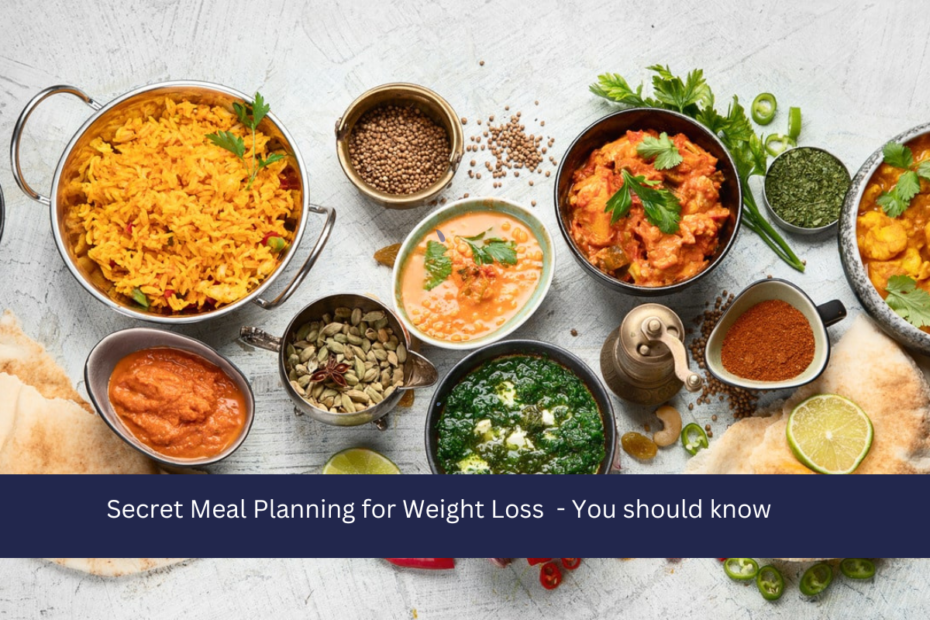Secret Meal Planning for Weight Loss – You should know:The process of effectively preparing meals for weight loss entails more than just selecting foods with less calories; it also involves developing a diet that is well-balanced, sustainable, and in line with your lifestyle and the goals you have set for yourself.
When it comes to hidden meal planning, the following are some crucial techniques and strategies that can assist you in achieving and maintaining your weight loss goals:
Pay Attention to Foods That Are Rich in Many Nutrients
Foods that offer a large quantity of nutrients in comparison to the number of calories they contain should be given priority. Specifically, this implies that you should load your plate with vegetables, fruits, lean proteins, and cereals that are whole.
Consuming foods that are high in nutrients allows you to feel full for longer and provides you with important vitamins and minerals without leaving you feeling bloated.
Controlling the Portions
For successful weight loss, portion control is of the utmost importance. Even foods that are considered to be healthful might cause weight gain if they are consumed in high quantities. When trying to control the amount of calories you consume, it is important to make use of smaller plates, be conscious of portion proportions, and measure serving sizes.
Make sure you plan well-balanced meals.
It is important to ensure that each meal has an appropriate proportion of protein, healthy fats, and complex carbohydrates. This equilibrium helps to maintain stable blood sugar levels and ensures that you continue to feel full.
As an illustration, a dinner might consist of grilled chicken (a source of protein), quinoa (a source of complex carbohydrates), and a side of steamed broccoli (a source of vegetable nourishment).
Make sure to include nutritious snacks in your diet.
Keeping your metabolism active and preventing you from overeating at mealtimes are both benefits of snacking on nutritious foods. Snacks that include protein and fiber are a good choice. Some examples of such snacks include apple slices with almond butter or Greek yogurt with berries.
Make Ahead of Time Preparations
Making meals ahead of time can help you save time and make better decisions for your health. Prepare meals and snacks in advance and portion them out to lessen the likelihood that you will give in to the temptation of reaching for bad options when you are hungry.
Take into consideration the possibility of preparing products in bulk, such as grilled chicken, roasted veggies, and quinoa, which can be easily combined and rearranged during the week.
Practices of Mindful Consumption
If you want to take pleasure in the food you eat, pay attention to your indications for hunger and fullness, and eat carefully. When you eat mindfully, you can prevent yourself from overeating and make more deliberate decisions about what you eat and how much you consume.
Remember to Stay Hydrated
As a result, thirst is frequently confused with hunger. Consuming an adequate amount of water throughout the day is beneficial to one’s general health and helps to control one’s hunger. Get at least eight glasses of water every day, and vary your intake based on the amount of physical activity you do and the weather.
Tracking your intake
For the purpose of gaining insights into your eating habits and assisting you in maintaining accountability, keeping a food journal or utilizing an app that tracks meals can be beneficial. The process of tracking might allow you to identify patterns and areas in which you might need to make modifications.
Prevent yourself from skipping meals.
It is possible to experience excessive hunger and make bad food choices later in the day if you skip meals often. Maintaining a constant metabolism and avoiding overeating can be accomplished by consuming meals and snacks on a regular basis.
Make sure to include a wide range of foods
Consuming a wide variety of foods not only helps you avoid being fatigued between meals but also guarantees that you receive a wide range of nutrients. Make an effort to keep your meals interesting and satisfying by experimenting with a variety of recipes and combinations of ingredients.
Adjust for Your Activity
The level of physical activity you engage in should be reflected in your food plan. To promote muscle repair and energy, you may require a greater quantity of calories and protein if you engage in more physical activity. On the other hand, if you are less active certain days, you might need to change the number of calories you consume correspondingly.
ALSO SEE:6 Benefits of Turkey Neck Exercises
Do not hesitate to seek the advice of professionals.
When you seek the guidance of a licensed dietitian or nutritionist, you can receive individualized recommendations that are tailored to your particular requirements, preferences, and health objectives. In addition to providing support and accountability, a professional may assist you in developing a personalized eating plan.
By incorporating these ideas into your meal planning, you will be able to develop a method of weight loss that is not only effective but also sustainable, and it will also contribute to your general health and well-being.
